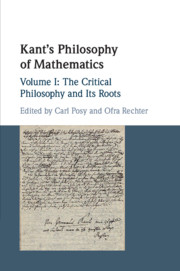Introduction
Published online by Cambridge University Press: 24 April 2020
Summary
Kant’s Philosophy of Mathematics: Modern Essays appeared in 1992.1 It was a pioneering effort designed to announce and promote a newly minted renaissance in the study of Kant’s philosophy of mathematics, and it set the agenda for a generation of scholars in this field. Indeed, since that anthology appeared, the study of Kant’s philosophy of mathematics has solidified into a well-established area of study within the philosophy of mathematics and within the study of the history of philosophy. The present two-volume collection aims to give a snapshot view of this thriving academic field. What has grown in the quarter-century separating these two collections is a fine-grained analysis of Kant’s philosophy of mathematics in the context of his overall philosophy as well as a historical sensitivity to its background. There has also been a spate of interest in taking these studies further, to see how the perception of Kant influenced nineteenth- and twentieth-century philosophy of mathematics. The present two-volume collection displays the recent developments in all of these directions.
- Type
- Chapter
- Information
- Kant's Philosophy of Mathematics , pp. 1 - 12Publisher: Cambridge University PressPrint publication year: 2020

